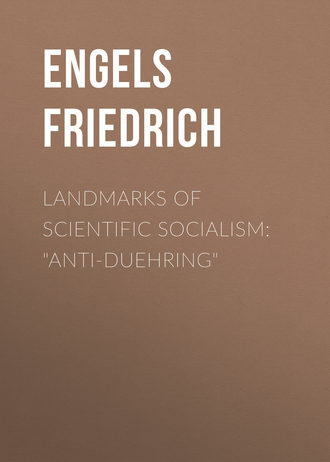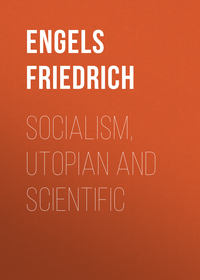 полная версия
полная версияLandmarks of Scientific Socialism: "Anti-Duehring"
The idea of purpose furnishes Herr Duehring with his conception of the transition to the organic world. This is again borrowed from Hegel, who in his "logic" – teachings of the concept – mingled with teachings of teleology or of purpose, passes over from chemistry to life. Whichever way we look we discover Herr Duehring to be in possession of Hegelian lore which he gives forth without any embarrassment as his own fundamental philosophy. It would be too long a task to find out here just how far the application of the ideas of purpose is correctly stated and applied to the organic world. The application of the Hegelian "inner purpose" at all events is evident, that is, of a purpose which is imported into nature not through a consciously acting third party, like the wisdom of Providence, but which is inherent in matter itself, which among people who are not well versed in philosophy proceeds to the unthinking supposition of a conscious and all-wise agent; the same Herr Duehring who breaks out into unmeasured moral indignation at the least tendency towards spiritism on the part of other people, tells us that "sex sensations are certainly mainly directed towards the gratification which is bound up in their exercise." He tells us moreover that "poor Nature must always hold the objective world in order" and it has besides to perform acts which require more subtlety from Nature than we usually attribute to her. But nature knows not only why she does this and that. She has not only her housemaid's duties to perform, she has not only subtlety, which is a very pretty accomplishment, in subjective conscious thought, she has also a will, for "we must regard the additional natural desires which occur, such as feeding and propagation, not as directly but as indirectly willed." We now arrive at a consciously thinking and acting nature, and we therefore stand right at the bridge, not indeed between the static and dynamic but between pantheism and deism, or perhaps Herr Duehring is pleased to indulge himself in a little "natural-philosophical half-poetry."
Impossible. All that the realistic philosophy has to say on organic nature is limited to a war against this natural philosophical half-poesy against "Charlatanism with its wanton superficialities and pseudo-scientific mysticism, against the poetic features of Darwinism."
Darwin comes in for a share of blame chiefly because he transferred the Malthusian theory of population from political economy to natural science, because he is entangled by his notions of breeding, so that his work is a sort of unscientific half-poetic attack against design in creation, and that the whole of Darwinism, after what he has borrowed from Lamark has been deducted, is a piece of brutality aimed against humanity.
Darwin had brought home with him as the result of his scientific journeys the conclusion that species of plants and animals are not fixed but are subject to variations. In order to pursue this idea he entered upon experiments in the breeding of plants and animals. Just for this reason England has become a classic land. The scientists of other countries, Germany, for example, have nothing to offer comparable with England in this respect. Moreover, most of the conclusions belong to the last century so that the establishment of the facts presented few difficulties. Darwin found that this artificial breeding produced differences in the species of plants and animals greater than occur among those which are universally recognised as belonging to different species. Therefore it was, up to a certain point, proved that species can change and furthermore there was established the possibility of a common ancestry for organisms which partake of the characteristics of different species.
Darwin now examined the question whether there were not in nature causes – which without the conscious intention of the breeder – might in the course of time, by means of heredity, produce changes in the living animal analogous to those produced by scientific breeding. These causes he found in the disproportion between the enormous number of germs made by nature and the small number of beings which actually come to maturity. But as the germ struggles for its own development there is of necessity a consequent struggle for existence, which not only shows itself directly in the wear and tear of the body, but also as a struggle for space and light, as in the case of plants. And it is evident that in this fight those individuals have the best prospect of coming to maturity and reproducing themselves which possess certain qualities, perhaps insignificant, but advantageous in their fight for existence. There is a tendency towards the inheritance of these individual properties, and if they occur in several individuals of the same species towards development in the direction once taken, by virtue of the accumulated heredity, while the individuals which are not possessed of these qualities succumb more easily and little by little disappear in the struggle for existence. Thus a species naturally changes by the survival of the fittest.
Against this theory of Darwin Herr Duehring urges that the origin of the idea of the struggle for existence is, as Darwin himself confessed, based on the views of the political economist and theorist, Malthus, on the population question, and he covers it with all the abuse appropriate to the clerical Malthusian views on keeping down the population. Now it happens that Darwin never said that the cause of the struggle for existence theory was to be sought from Malthus. He only said that his theories respecting the struggle for existence are the theories of Malthus applied to the entire vegetable and animal world. How great a blunder Darwin made when he so naively accepted the teachings of Malthus without examination may be seen from the fact that there is no need to employ the spectacles of Malthus in order to detect the struggle for existence in nature, – the contradiction between the innumerable mass of germs which nature produces in such prodigality and the slight number which can manage to reach maturity, a contradiction which resolves itself into an apparently grim fight for existence. And with regard to the law of wages the Malthusian doctrines are widely advertised and Ricardo based his contentions upon them, – so the struggle for existence in nature may find a standing even without the Malthusian interpretation. Besides the organisms of nature have their law of population, the establishment of which would decide the theories of the development of species. And who gave the decisive impetus in that direction? Nobody but Darwin.
Herr Duehring is on his guard against entering upon the positive side of this question. Instead he must again find fault with the struggle for existence. There can be no argument about a struggle for existence between plants and the genial eaters of plants "in a sufficiently accurate sense the struggle for existence only occurs within the sphere of brutality, in so far as nourishment depends upon robbery and consumption." And after he has reduced the concept struggle for existence to these narrow limits he gives his wrath free play as regards the brutality of this conception which he himself has narrowed down to a brutal conception. But this moral wrath simply reacts on Herr Duehring himself, the inventor of this sort of struggle for existence. It is not Darwin therefore who seeks among the lower animals the "conditions of the operations of nature" (as a matter of fact Darwin would have included the whole of organic nature in the struggle), but one of Herr Duehring's bugaboos. The expression "struggle for existence" in particular excites Herr Duehring's lofty moral scorn. That this actually exists among plants every meadow, every cornfield and every wood can show him. We need not trouble about the name, whether one call it "struggle for existence" or "lack of the conditions of existence and want of mechanical realisation," but as to how this fact operates as regards the maintenance or transformation of species. With regard to this Herr Duehring persists in a characteristically stubborn silence. We cannot trouble ourselves any more about natural selection.
But "Darwinism produces its changes and differentiations out of nothing." Darwin thoroughly understands that he is engaged with the causes which have produced changes in individuals and in the second place he is engaged with the mode in which such individual differentiations tend to mark off a race, a genus, or a species. Darwin moreover was less occupied in discovering these causes, which up to the present are either entirely unknown or on which there is only general information, than in discovering a rational form in which to establish their reality, to embrace their permanent significance. But Darwin ascribed too wide a reach to his discovery in this that he made it an exclusive means of variation in species and neglected the causes of individual differentiations from the general form. This mistake however is common to most people who make a step forwards. Next, if Darwin produces his changes in individual types out of nothing and thereby excludes the wisdom of the breeder, the breeder on his part must not only display his wisdom but he must produce out of nothing real changes in plant and animal forms. But who has given the impetus to the investigation as to whence these variations and differentiations proceed? It is again no one but Darwin.
Lately the conception of natural selection has been broadened, by Haeckel, in particular, and the variation of species has been shown to be the result of actual change owing to adaptation and inheritance, whereby adaptation is considered as the source of variations and heredity as the conserving element in the process. Even this is not correct in Herr Duehring's eyes. "Peculiar adaptation to the circumstances of life as they are offered or withheld by nature supposes impulses and facts which answer to the conception. Hence adaptation is only apparent and actual causality does not elevate itself above the lowest steps of physical, chemical and plant physiology." It is again the name which provokes Herr Duehring. But how does he deal with the matter? The question is if such changes do take place in the species of organic beings or not. And again Herr Duehring has no reply.
"If a plant in the course of its growth takes a direction by which it gets the most light the result is nothing but a combination of physical forces and chemical agents, and if we are to call it an adaptation, not metaphorically but strictly, confusion is certain to arise in the motion." This man is so exacting with other people because he is quite well acquainted with the intentions of nature and speaks of the subtlety of nature, even of its will. There is confusion, indeed, but with whom, with Haeckel or with Herr Duehring?
And the confusion is not only spiritual but logical. We have seen that Herr Duehring put forth all his efforts to make the purpose idea in nature real. "The relation of means and end does not by any means show a conscious intention." But what is adaptation without conscious intention, without any intrusion of design of which he complains so loudly, but an unconscious teleology?
If the color of tree frogs and leaf eating insects is as a rule green and that of beasts that inhabit the desert sandy-yellow, and that of polar animals white, they have certainly not come into possession of this coloring intentionally or through any kind of mental process, on the contrary the coloring can only be explained by means of the operation of physical substances and chemical agents. And yet it cannot be denied that by these colors these animals are particularly adapted to the conditions in which they are and it is certain that they are by their means rendered less visible to their enemies. Just of a similar nature are the organs by which certain plants seize and consume certain insects (the means being on their under side, suited to this purpose and adapted to this end). Now if Herr Duehring insists that the adaptation must be realised through the operation of thought, he only says that the purpose must be carried out through mental operation, must be conscious and intentional. Thus again, just as in the philosophy of realism we arrive at the Creator with a purpose, at God. Formerly this kind of declaration was called "deism" and Herr Duehring says that we had not much regard for it, but it now appears that the world has gone backwards in this respect also.
From adaptation we come to heredity and here according to Herr Duehring Darwinism is quite out. "The whole organic world, Darwin explained, came from a single germ, is, so to speak, the brood of a single being. Independent similar products of nature according to Darwin do not exist without heredity and his retrogressive philosophy must come to a full stop when the end of the thread of ancestry is reached, or the original vegetable form."
The statement that Darwin traced all existing organisms from one original germ is to put it politely a piece of pure imagination on the part of Herr Duehring. Darwin says distinctly on the last page of the Origin of Species, Sixth Edition, that he regards all living beings not as separate creations but as the descendants in a direct line from some fewer beings and Haeckel makes a distinct advance on this ascribes "an entirely distinct source for plants and another for the animal kingdom" and on and between both of them "a number of original stems each of which has developed independently from one single primary monistic form." (History of Creation page 397.) This original form of life Herr Duehring discovers solely to bring it into contempt by paralleling it with the first man according to Jewish tradition, Adam. Here, unfortunately for Herr Duehring, he does not know how this original Jew turns out, according to Smith's Assyrian discoveries to have been the original Semite, and that the entire Biblical story of the Creation and the Flood has been shown to have been taken from a legendary store common to the Jews, Babylonians, Chaldeans, and Assyrians.
It is brought forward as a severe and irrefutable reproach to Darwin that he is at an end where the thread of descent fails him. Unfortunately the whole of our science deserves the same reproach. When the thread of descent fails it it is "at an end." It has not yet come to the point of creating organic beings without an ancestry, not even once has it been able to make simple protoplasm or other albuminous bodily forms out of the chemical elements. It can only say therefore with any certainty regarding the origin of life, that it must have come about by a chemical process. But perhaps the philosophy of realism can give us some assistance here since it is engaged with independent organic natural products, without any descent one from another. How can these come into being? By original creation? But up to the present not even the most audacious advocates of spontaneous generation have claimed to create in this way anything except bacteria, fungi, or other very elementary organisms, but not insects, birds, fish or mammals. If these homogeneous products of nature – it is understood for all this discussion that they are organic – are not related through descent, they or their ancestors, then "where the thread of descent breaks" they must have been placed in the world by a separate act of creation, and this again requires a creator, what we call "deism."
Herr Duehring further explains that "it was a piece of superficiality on the part of Darwin to make the mere fact of the sex-composition of qualities the foundation for the existence of these qualities." Here we have again a piece of pure imagination on the part of our profound philosopher. On the contrary Darwin says that natural selection has to do only with the maintenance of variations and not with their origin. This new supposition however of things which Darwin did not say serves to assist us to this deep idea of Duehring. "If a principle of individual variation had been sought in the inner scheme of creation it would have been an entirely rational idea. For it is natural to unite the idea of universal generation with that of sex propagation, and to regard the so-called original creation from the higher point of view, not as absolutely antagonistic to reproduction but even as reproduction itself." And the man who could write this is not ashamed to reproach Hegel with writing jargon.
Let us call a halt to the vexatious and contradictory babble with which Herr Duehring proclaims his wrath against the advance given to science by the theory of Darwin. Neither Darwin nor his followers among the natural scientists have any idea of belittling Lamark's tremendous services, in fact they are the very people who first restored his fame. But we are unable to ignore the fact that in the time of Lamark science was still far from supplied with competent material to enable it to answer the question of the origin of species other than in a prophetic or, as it were anticipatory, manner. In addition to the enormous amount of material in the realm of general, as well as of that of anatomical, botany and zoology, accumulated since that time, two entirely new sciences have since come into existence – the investigation of the development of plant and animal germs (embryology), and the investigation of the organic survivals in the earth's crust which still remain. There is a distinct similarity between the steps in the development of the organic germ to mature organism, and the successive steps by which plants and animals succeed each other in the history of the world. It is just this similarity which has placed the evolution theory on its most secure foundations. The theory of evolution is however still very young and it is beyond question that upon further investigation the rigid Darwinian ideas upon the origin of species will be considerably modified.
But what has the realist philosophy of a positive nature to contribute with respect to the evolution of organic life? "The variation of species is an acceptable supposition, but there exists, in addition, the independent order of the products of nature belonging to the same species without any intervention of descent." According to this we are to conclude that products of unlike species, that is species which vary, are descended from one another, but those of similar species not. But even this is not altogether correct, for he ventures to say of the varying species, "The part played by descent is on the contrary a very secondary activity of nature." There is heredity, then, but it is only to be reckoned as a factor of the second class. Let us be glad that heredity of which Herr Duehring has said so much that is evil and mysterious is at least let in by the back door. It is just the same with natural selection, since after all his moral indignation with respect to the struggle for existence by means of which natural selection fulfils itself he suddenly exclaims, "The most important constituent is to be found in the conditions of life and cosmic conditions, while natural selection as set forth by Darwin may be considered as secondary." Natural selection still exists, even if a factor of the second class, like the struggle for existence, and the clerical malthusian surplus-population theory. That is all, for the rest Herr Duehring refers us to Lamark.
Finally, he warns against misuse of the terms metamorphosis and evolution. Metamorphosis, he says, is a very obscure notion, and the concept of evolution is only admissible in so far as a law of evolution can be really proved. Instead of either of these expressions we should employ the term "composition" and then everything would be all right. It is the same old story over again, Herr Duehring is satisfied if we change the names. If we speak of the evolution of the chicken in the egg we give rise to confusion because we have only an incomplete knowledge of the law of evolution. But if we speak of its "composition" everything becomes clear. We must therefore say no longer "this child is growing nicely" but, "he composes himself splendidly," and we congratulate Herr Duehring upon the fact that he is not only a peer of the author of the Niebelungen Ring in his opinion of himself but in his own particular capacity is also a composer of the future.
Organic World (Conclusion)"One reflects upon our natural philosophical portion of positive knowledge in order to fix it relatively to all one's scientific hypotheses. Next in importance come all the actual acquisitions of mathematics as well as the leading principles of exact science in mechanics, physics and chemistry and particularly the scientific results in physiology, zoology, and antiquarian investigation."
Herr Duehring speaks in this confident and decided fashion with respect to the mathematical and scientific scholarship of Herr Duehring. One cannot detect in its meager shape and in its scanty and audacious results the extent of positive knowledge which lies behind. Every time the oracle is consulted for a definite statement as regards physics or chemistry we get nothing as regards physics but the equation which expresses the mechanical equivalent of heat, and concerning chemistry only this that all bodies are divisible into elements and combinations of elements. He who can speak as Duehring does about "gravitating atoms" shows at once that he is quite at a loss to understand the difference between an atom and a molecule. Atoms, of course, exist, not with respect to gravitation or any other physical or mechanical form of motion, but only as concerns chemical action. And if the last chapter on organic nature is read, the empty, self-contradictory, assertive, oracular, stupid, circuitous absolute nothingness of the final result lead one to the conclusion that Herr Duehring talks about things of which he knows very little and this conclusion becomes a certainty when we come to his proposal in the course of his writing on organic life (biology) to use the term "composition" instead of evolution. He who can make such a suggestion as that gives evidence that he is not acquainted with the building up of organic bodies.
All organic bodies, the very lowest excepted, develop from small cells by the increment of visible pieces of albumen with a central cell. The cell generally develops an outer skin and the contents are more or less fluid. The lowest cell-bodies develop from one cell; the enormous majority of organic beings are many-celled and among the lower forms these take on similar, and among the higher forms greater variations of, groupings and activities. In the human body for example are bones, muscles, nerves, sinews, ligaments, cartilage, skin, all either made up of cells or originating in them. But for all organic bodies, from the amœba which is a simple and for the most part unprotected piece of albumen with a cell centre in the midst to man, and from the smallest one-celled desmidian to the highest developed plant, the mode is one and the same by which the cells propagate themselves, that is by division. The cell centre is first laced across its midst, the lacing which separates the centre into two knobs becomes stronger and stronger and at last they become separated and two cell centres are formed. The same occurrence takes place in the cell itself. Each of the cell centres becomes the middle point of a collection of cell stuff which by knitting ever closer becomes combined with the other, and finally both of them part and live on as separate cells. Through such repeated cell divisions the full sized animal gradually develops from the germ of the animal egg after fructification and the substitution of used up cells in the full grown animal is brought about similarly. To call such a process "composition" and to speak of the term "evolution" as a purely imaginary term belongs to one who does not know anything of the matter, hard as it is to imagine such ignorance at this date.
We have still somewhat to say with respect to Herr Duehring's views of life in general. Elsewhere he sets forth the following statement with respect to life. "Even the inorganic world is a self-regulated system but one may undertake to speak of life in the proper sense first when the organs and the circulation of matter through special separate channels from a central point to another germ collection of a minor formation begin."
If life begins where the separate organs begin then we must hold all Haeckel's protozoa (Protistenreich) and probably many others as dead; all organisms at least up to those composed of one cell and those included are not capable of life. If the means of circulation of matter through different channels is the distinguishing mark of life we must place outside of this definition all the upper classes of the colenterata entirely, with the exception of the medusae, and therefore all the polypi and other plant animals are also to be considered as being outside the class of living creatures. And if the circulation of matter through different canals from an inner point is the distinguishing characteristic of life we must reckon all animals as dead which either have no heart or several hearts. Besides these there belong also to this category all worms, starfish and ringed creatures (annuloids and annulous according to Huxley's definition) a portion of the shell fish, crabs, and finally a vertebrate animal, the lancelet (amphioxus) and all plants.






